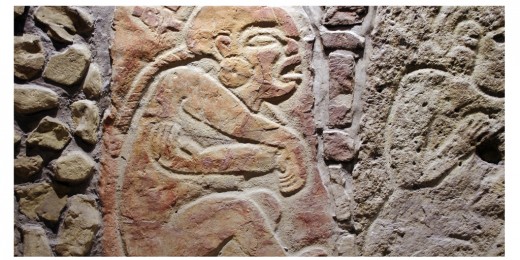History of Anthropological Studies
2.Anthropology in the Eighteenth Century
Concerning the eighteenth century, it was characterized by two preeminent figures: Lafitou and William Robertson.
Lafitou, J.E. (1681-1746) dealt with comparative ethnology. In this domain he wrote two volumes comparing the customs of "American savages” with the previous and ancient nations (hoebel.1966; 508)
William Roberston (1721-1793), a Scottish historian and ethnological evolutionist, defined the three stages of evolution: savagery, barbarism, and civilization. He published a book in 1777 entitled “history of America" (hoebel 1966:509).
Lafitou, J.E. (1681-1746) dealt with comparative ethnology. In this domain he wrote two volumes comparing the customs of "American savages” with the previous and ancient nations (hoebel.1966; 508)
William Roberston (1721-1793), a Scottish historian and ethnological evolutionist, defined the three stages of evolution: savagery, barbarism, and civilization. He published a book in 1777 entitled “history of America" (hoebel 1966:509).
3.Anthropology in the Nineteenth Century
If
the eighteenth century was the beginning of anthropology, the
nineteenth century was the period in which anthropology developed
because of effective contributions of some figures like, Tylor, Maine,
Morgan and Franzer.
Sir Edward Tylor, an English anthropologist, was the founder of American cultural anthropology. His duty was to study and to examine various types of animism among different primitive societies. His major work consisted in publishing two volumes on “the development of religion and culture”. He also published “the primitive culture” in 1871, and “History of culture” in 1876 (Hoebel 1966: 519).
Henry Maine, a specialized legal historian, published his first book “Ancient law” in 1861. In this book he criticized some hypotheses concerning the development of ancient law. He wrote also three books which explained the ancient law (Stocking, J.r 1987: 121-27).
Lewis Morgan (1818-1881), an American social evolutionist, specialized in the study and analysis of Kinship systems and social organizations. He developed the basic stages of evolution (savagery, barbarism and civilization) which were defined by Robertson. In 1871 he published “systems of consanguinity” (Hoebel 1966:512). In favor of his major work in the field of anthropology, he was described as the founder of British social anthropology (Stocking, J.r 1987:301).
J.G. Franzer, a religious evolutionist like, E.B Tylor. His major work consisted in writing two volumes on the subject of the development of magic and religion (Hoebel 1966:515).
Sir Edward Tylor, an English anthropologist, was the founder of American cultural anthropology. His duty was to study and to examine various types of animism among different primitive societies. His major work consisted in publishing two volumes on “the development of religion and culture”. He also published “the primitive culture” in 1871, and “History of culture” in 1876 (Hoebel 1966: 519).
Henry Maine, a specialized legal historian, published his first book “Ancient law” in 1861. In this book he criticized some hypotheses concerning the development of ancient law. He wrote also three books which explained the ancient law (Stocking, J.r 1987: 121-27).
Lewis Morgan (1818-1881), an American social evolutionist, specialized in the study and analysis of Kinship systems and social organizations. He developed the basic stages of evolution (savagery, barbarism and civilization) which were defined by Robertson. In 1871 he published “systems of consanguinity” (Hoebel 1966:512). In favor of his major work in the field of anthropology, he was described as the founder of British social anthropology (Stocking, J.r 1987:301).
J.G. Franzer, a religious evolutionist like, E.B Tylor. His major work consisted in writing two volumes on the subject of the development of magic and religion (Hoebel 1966:515).
4.Anthropology in the Twentieth Century
As
to twentieth century, it was the period in which anthropological
studies developed to some extent in comparison with the previous
centuries because of effective efforts of some preeminent
anthropologist, like, Boas and Malinoski.
Frank Boas, a historical deconstructionist, was the first one to produce recording method. In this respect, he was concerned with recording beliefs, ceremonies, and myths of primitive societies and analyzing them according to their historical context (Hoebel 1966:517). His aim behind dealing with recordings was to reconstruct the history of cultures (Stocking J.r 1987:318).
Bronislow Malinoski (1884-1942), a polish-born British anthropologist and a pure functionalist, considered culture as social systems. He was against the reconstruction of Boas which depended on recording. He insisted that anthropological studies must be on living societies and not on societies of the forgotten past (Hoebel 1966:519-20)..
Frank Boas, a historical deconstructionist, was the first one to produce recording method. In this respect, he was concerned with recording beliefs, ceremonies, and myths of primitive societies and analyzing them according to their historical context (Hoebel 1966:517). His aim behind dealing with recordings was to reconstruct the history of cultures (Stocking J.r 1987:318).
Bronislow Malinoski (1884-1942), a polish-born British anthropologist and a pure functionalist, considered culture as social systems. He was against the reconstruction of Boas which depended on recording. He insisted that anthropological studies must be on living societies and not on societies of the forgotten past (Hoebel 1966:519-20)..
5.Conclusion
To
conclude, due to the major works of these preeminent figures in the
field of anthropology, it can be said that anthropology emerged and
developed really through the three centuries. The anthropologists of the
eighteenth century were the founders of anthropology, and the
anthropologists of the nineteenth and the twentieth centuries were the
developers of it. Due to the effective efforts of these anthropologists,
anthropology gave and still gives its real fruits which consist in the
emergence of some anthropologists who focus their studies either on
modern or ancient societies
BY: ABDELMAJID YAQOUBY








No comments:
Post a Comment